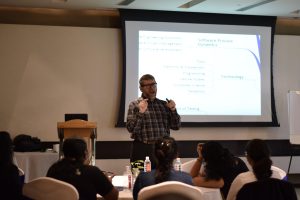 Trust between the employer, employee and the organization that we serve is essential. It builds a positive outlook on the ecosystem among peers who need to work together every day. By practising our craft, building credibility we can gain respect and tend towards building trust between peers. At Moolya, trust is an integral part and it reflects how we treat each other. Here are a few questions around the same topic ‘Trust’ and a few others that we collated and put together for you the questioner and the reader.
Trust between the employer, employee and the organization that we serve is essential. It builds a positive outlook on the ecosystem among peers who need to work together every day. By practising our craft, building credibility we can gain respect and tend towards building trust between peers. At Moolya, trust is an integral part and it reflects how we treat each other. Here are a few questions around the same topic ‘Trust’ and a few others that we collated and put together for you the questioner and the reader.
Q) What does trust do to a new and experienced employee at the workplace?
A) Trust is partly about feeling able to predict someone’s behaviour, and partly about feeling no fear about that behaviour. I trust you in some way if I think I know what you will do and that you won’t hurt me. But trust is not monolithic. I may trust you in some ways while not necessarily in other ways.
When you ask me “what does trust do” that is ambiguous. The question could mean “what effect does it have on a person to feel trust for someone else?” or it could mean “what effect does it have on a person to be trusted by others?”
To be trusted is to be respected. This can lift morale and give us motivation– unless we don’t trust ourselves, in which case it may have the opposite effect. This is why it’s important that deep trust is earned, and you have to know you have earned it.
To trust our company and co-workers allows us to innovate better because we are more willing to take risks.
So, trust is very important.
New employees should be tested early and often so that they can earn trust quickly, but they also must be tested fairly and compassionately, or else they will lose trust for the company.
Experienced employees, we hope, have already earned trust. But that trust does not transfer to a new company. This can be pretty annoying for very experienced people, who feel that they have already earned the trust and expect new employers to trust them immediately. This is why I run my own company and work for my wife!
Q) Are there any ill effects of not placing trust in your workforce? And how does this affect an employee?
A) If you don’t trust someone who feels that he has earned it, morale and motivation will plummet. If you don’t trust someone who knows he has not YET earned it, that can be good for motivation. Excellence is not easy to achieve, and I think it’s important for people to see that only people who are good at their jobs are fully trusted.
Q) How trusting the new testers help them as future professionals?
A) Trusting them to be able to learn gets them started. However, we should not trust them too quickly to be good at testing, or we will be setting a poor standard.
Q) Is there a limit on the trust that the workforce can have on its employer and vice versa?
A) I’m not sure what this question means, so I will guess. I think it may mean “Should workers be wary of trusting their employer too much?” The answer to that is yes.
Do not trust your employer to take care of your career. Only you can do that. Your employer just wants to get value out of you, not help you achieve your ambitions.
Q) Remaining relevant in testing in the age of AI, ML (and other technical terms that keep popping up such as DevOps, TestOps) mean to you as an experienced tester?
A) Develop your skills and show your employer how those skills are helping the company. Develop a variety of skills, including learning about AI. But recognize that your relevance has at least as much to do with how trusted you are as it does with what tools and techniques you might know about.
Q) What is your suggestion to someone with no formal testing education and is still not a seeker of testing know-how through self-learning or training?
A) Someone who is not trained and isn’t learning? My suggestion for them is don’t be a tester.
Q) Would you as a new tester or as an experienced tester on a path of learning, ever question your employer or your immediate manager about the training budget that gets allotted but is never used or is misused?
A) Yes. I did exactly that when I was a young test manager. I questioned it in a public all-hands meeting. The business unit manager was so angry with me I was told he wanted me to be fired. Still, I would do it again. Training is important. Bear in mind, however, that I am a reckless American. Perhaps you are more sensible and careful in India. I started my own company so that I could learn anything I wanted and spend anything I wanted to learn it, but that is pretty extreme.
Q) As an experienced tester what according to you in the testing industry has not been addressed yet?
A) I’m not sure I understand the question. I’m going to guess you are asking whether there is some topic that is poorly addressed in the industry. If so, there are many such topics. My favourite one to talk about is: test-ability. A lot depends on how testable a product is: Poor test-ability leads to testers getting blamed for things that aren’t their fault.
Author Bio
James Bach is a testing consultant and author of Lessons Learned in Software Testing. He travels and teaches his testing methodology Rapid Software Testing around the world.
1